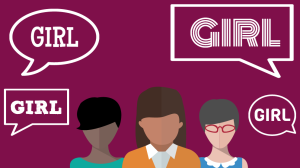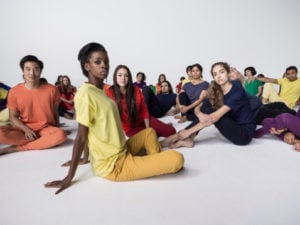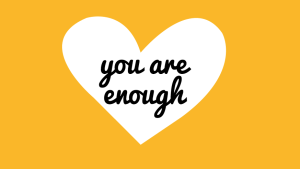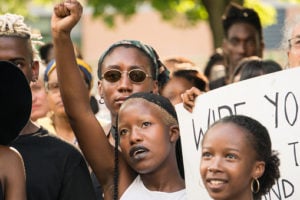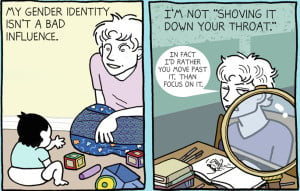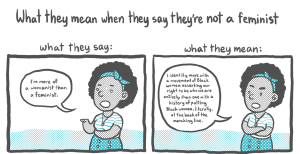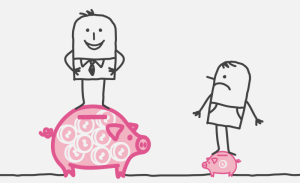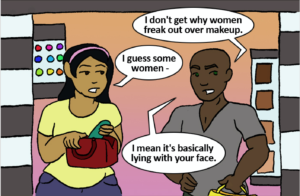
A person with a navy blue hat stares into the camera while adjusting their glasses.
After gawking at the comfortable seats in first class and then trekking to the back of the plane, I noticed that my seat was next to a man wearing a turban.
He got up so I could slide into the row and claim the window seat. As I stashed my bag under the seat and got comfortable, I looked to my right and noticed the man was video chatting with a group of men all wearing turbans.
Instantly, I thought, Was this a terrorist organization? Was this flight going to make it to its destination safely?
Then I thought, Oh my God, I’m a racist!
Shame on me. I’m a black, self-proclaimed feminist who writes about injustice, and here I am wondering if this man is a terrorist simply because he is brown, wearing a turban, and video chatting with folks that look like him.
Did I just have a Donald Trump Moment?
I should’ve really known better. I’ve watched my Persian and Muslim travel buddies get “randomly selected” for additional security searches. I’ve had my own issues with TSA agents running their fingers through my braids. And as a black girl who has found herself in various uncomfortably white spaces, you would think that I would have better judgement.
However, those fears I had on the plane showed that deep down, all of the media surrounding terrorism had impacted my views.
Subconsciously, I held discriminatory ideas.
So I had to come down from that black feminist, social justice warrior high horse to admit that I am just like everyone else.
We all hold certain biases, known or unknown.
But some people believe that it is possible to be objective on racial issues.
For example, several years ago, I read an article on whitewashing in Hollywood by a white writer. It was interesting because I’d published a similar piece that week, discussing the same points and reaching the same conclusions she had. As I was reading, I felt a bit jealous that I hadn’t thought of pitching and publishing my story on the renowned site she was writing for.
However, toward the end of her piece, she points out that the reason she was able to publish this piece and get such a large audience to read it was because she was white. She mentioned that her white audience wanted to read her thoughts on the subject of whitewashing because they assumed she could be impartial.
Like some of her audience, many white people believe that white folks have no stake in racial issues, and are therefore able present unbiased information on the topic.
But this isn’t as true as many think it is.
Actually, objectivity on racial issues in a harmful myth. Impartiality on such a loaded subject is impossible for many reasons.
I’ll give you three of them:
1. No One Exists in a Vacuum
From the moment we’re born, we’re inundated with messages and points of view about the world. We pick up information from our parents, friends, teachers, billboards on our daily commutes, TV shows, and from so many other mediums.
These people and entities each have their own biases and agendas. From them, we create our own points of view and “truths,” based on what we’ve been exposed to.
Remember that reaction I had on the plane and how shocked I was that I held such prejudice beliefs — well, where do you think that reaction came from?
I’ve been flying across the country to visit family since I was a child, and I didn’t always wonder if other people on the plane had any intention to blow it up. However, my first introduction to terrorism came in the 5th grade during the attacks of 9/11. And since that day, I, like millions of other Americans, have been constantly bombarded with messages about what a terrorist is, what a terrorist looks like, and what a terrorist does.
Isn’t it possible that in those 12 years since the media has been broadcasting (seemingly nonstop) about terrorism, it had an impact on our views on terrorism?
That doesn’t mean that we aren’t able to think for ourselves.
Like I said, many of us understand how “terrorist” is a loaded word that only applies when certain people of color are involved – white men who commit or attempted to commit mass-murders aren’t given the label.
Many of us understand that our media sometimes uses stories of terrorism to create fear in order to increase their audience size.
Many of us understand that not everyone who looks like they might get “randomly selected” by a TSA agent is a terrorist.
Most of us are not Donald Trump.
But our knowledge and good judgment don’t fully prevent us from being influenced by the images we come in contact with on the news, our favorite TV shows, billboard ads, magazines, or wherever else.
Sometimes, we are influenced by things without even realizing it, as I came to understand while I was on the plane.
So it’s difficult to be objective on a loaded topic such as racial injustice when we are constantly influenced by the world around us. Our very placement in society makes impartiality impossible.
2. Privilege Doesn’t Allow Objectivity
As I mentioned before, many people believe it’s possible to be impartial on racial issues when they have no stake in the matter. However, what many people don’t realize is that everyone has a stake in the matter when it comes to racial injustice.
There’s a myth that white people are somehow uninvolved in racial issues because they are not a minority group in the US.
Yet, white is a race. Sure, white people do not face certain types oppression other races in the US face, but their race does contribute to their experiences in our society.
White people have a stake in racial matters because their race affords them certain benefits that, and by that I mean white privilege.
White privilege, the societal benefits one receives for simply being white, plays a huge role in white people’s inability to be objective on racial issues.
White people benefit from racist institutions in our society, so they aren’t totally detached from the subject of racial injustice. Whiteness plays a major role in how strict a punishment or sentence is when someone commits a crime. It plays a role in who gets selected for leading and supporting characters in movies. And sadly, it plays a role in whether or not the police decide to shoot.
Being white means you come out on top in all three of these situations I mentioned, while other races may get the shorter, sometimes deadlier, end of the stick.
White privilege also creates “blind spots” in your point of view because you have not experienced or do not know about a certain type of oppression.
If you don’t fear for your life when a cop pulls you over, then maybe police brutality doesn’t seem like a looming threat. But for someone who has had a cop pull a gun on them because the officer felt threatened, police brutality might feel like an imminent danger – especially if you’re more likely to get pulled over.
Just because you don’t encounter as much police brutality doesn’t make you an impartial figure on the issues. It simply means you might be lacking information on the topic because it isn’t your lived experience.
3. The Language We Use to Describe Racial Injustice Is Often Loaded
It’s also difficult to be impartial when the language we use isn’t.
If you follow the stories surrounding the many black people killed by the police and the protests following the incidents, you’ll notice the interesting ways the victims and protesters are discussed.
When commenting on the various incidents, many people threw around words “thug” and “rioters” like they were absolute truths.
I’m glancing in your direction, CNN and other TV News outlets.
However, “thug” has an extremely different connotation than the word “victim,” when describing someone who is no longer alive after an incident with a police officer. “Thug” makes it sound as if the now-deceased person deserved their death. “Victim,” which is also not a totally neutral word, sounds like the person suffered a loss.
“Protesters” and “rioters” also mean two different things.
Using one word versus the other may make the difference between a police chief’s decision to send a few officers to make sure the demonstration remains peaceful versus sending a SWAT team with loaded military-grade weapons.
“Angry” is another example of a loaded word, especially when used to describe passionate black women who speak out about the injustice they’ve experienced. People who call for an objective stance on the issues she speaks of discredit her views because she is considered “too passionate” or “too involved.”
In using the word “angry,” they also place her into the “Angry Black Woman” trope and discard her opinions in place of a calm, white, so-called objective ones. These are just a few of many examples of the way seemingly neutral language carries an agenda.
The language we use is biased, and creates certain pictures in people’s minds, often based on the stereotypes of various people of color.
Now, many white folks may not know or understand how the meaning or historical context behind the words affect the people they are used to describe. They may not have even meant for them to have such an impact. However, the impact is real and it occurs whether someone meant it not.
Not only is it real, it’s also dangerous.
Believing that it’s possible to be objective on racial issues is dangerous.
As I mentioned with the word “angry,” when people search for an “unbiased” opinion on racial issues, they’re often searching for a white, privileged perspective that is hindered by blindspots. This means they push aside voices that have the lived experience of racial injustice. This means silencing scores of people whose input matters the most.
Without the voices of people who have a lived-experienced, any discussion on racial injustice is one-sided and lacking in valuable information on how our societal ills can be resolved.
***
Instead of aiming for illusive objectivity, why not acknowledge our biases?
The goal is not to feel bad about them but to do something about them.
Recognizing that you have biases based on your feelings about a certain group of people and/or simply based on your privilege is the first step.
Next, you have to work through some of these biases. Maybe you need to reflect on where these negative opinions came from, like I had to do while sitting on the plane.
And while you cannot give up or get rid of your white privilege, there are several ways you can use it fight racism. In the context of this topic, you can use it to teach other white people who prefer to hear the opinions of other white people and you can use your privilege to make sure others are included in discussions on race.
This reflection and action can transform the way we discuss racial issues and alter the way we view people we come into contact with who don’t look like us. It incites progress.
So let’s replace pretend objectivity with real action.
[do_widget id=’text-101′]
Shae Collins is a Contributing Writer for Everyday Feminism. She enjoys educating and uplifting by aiming a black feminist lens at pop culture on her blog, awomynsworth.com. She’s been published in Ms. Magazine, For Harriet, and Blavity. Laugh with her on Twitter @awomynsworth.
Search our 3000+ articles!
Read our articles about:
Our online racial justice training
Used by hundreds of universities, non-profits, and businesses.
Click to learn more







